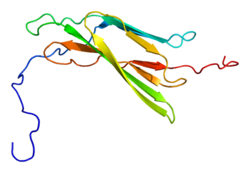MERTK
gène de l'espèce Homo sapiens
Le MERTK (pour « myeloid-epithelial-reproductive tyrosine kinase ») est une protéine à type de récepteur à activité tyrosine kinase. Son gène est le MERTK situé sur le chromosome 2 humain.
Rôles modifier
Il est activé par le GAS6[5]. Il facilite la phagocytose des cellules en apoptose[6] et intervient dans la cicatrisation, en particulier du muscle cardiaque après un infarctus[7]. Un déficit en cette protéine favorise l'apoptose et accélère la formation de l'athérome[8].
Notes et références modifier
- GRCh38: Ensembl release 89: ENSG00000153208 - Ensembl, May 2017
- GRCm38: Ensembl release 89: ENSMUSG00000014361 - Ensembl, May 2017
- « Publications PubMed pour l'Homme », sur National Center for Biotechnology Information, U.S. National Library of Medicine
- « Publications PubMed pour la Souris », sur National Center for Biotechnology Information, U.S. National Library of Medicine
- Chen J, Carey K, Godowski PJ, Identification of Gas6 as a ligand for Mer, a neural cell adhesion molecule related receptor tyrosine kinase implicated in cellular transformation, Oncogene, 1997;14:2033–2039
- Scott RS, McMahon EJ, Pop SM et al. Phagocytosis and clearance of apoptotic cells is mediated by MER, Nature, 2001;411:207–211
- Wan E, Yeap XY, Dehn S et al. Enhanced efferocytosis of apoptotic cardiomyocytes through myeloid-epithelial-reproductive tyrosine kinase links acute inflammation resolution to cardiac repair after infarction, Circ Res, 2013;113:1004–1012
- Ait-Oufella H, Pouresmail V, Simon T et al. Defective mer receptor tyrosine kinase signaling in bone marrow cells promotes apoptotic cell accumulation and accelerates atherosclerosis, Arterioscler Thromb Vasc Biol, 2008;28:1429–1431




